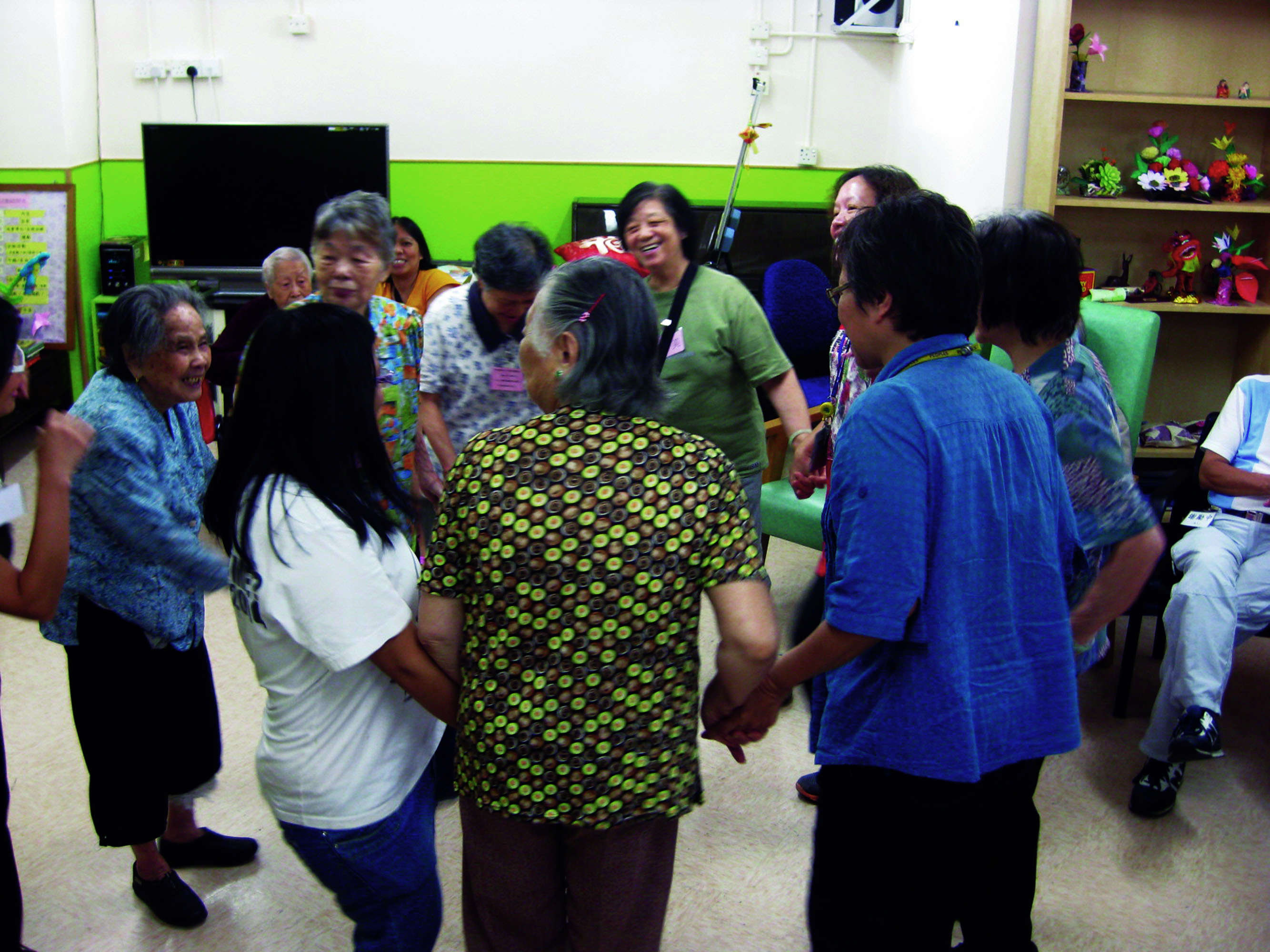Mental health problems and suicidal thoughts are common but often overlooked in the elderly
By Charlene Kwan and Katrina Lee
The sound of laughter and song travel along the corridor from a spacious room decorated with handicrafts and colourful collages. Tables with mahjong and chess sets have been set up, awaiting players to take their places. Walking closer to the cheerful sounds reveals a group of elderly people singing and listening to Cantonese opera.
Except for being livelier, this scene could resemble those found in most elderly homes. From the happy faces of the elderly people here, it might be hard to guess it is a centre providing hospital day services for elderly people diagnosed with mental disorders. Indeed, the Psychogeriatric Ambulatory Care Centre (PACC) of Kwai Chung Hospital is the only centre of its kind in Hong Kong.

Mental health problems are common among the elderly aged 60 or above in Hong Kong, some 30 to 40 per cent of whom are believed to have some sort of psychiatric disorder. Despite such a high prevalence, the care and attention they receive from society is far from satisfactory and there are unique challenges facing the mentally ill elderly that present obstacles to recovery.
Depression is one of the most common mental illnesses found in older people and affects up to 15 per cent of the elderly population. If left untreated, it can lead to suicide. According to the Institute of Mental Health (IMH) at Castle Peak Hospital, deaths from suicide are three times higher among the elderly than in the general population and 90 per cent of elderly suicide completers suffered from depression.
Unfortunately, many elderly people tend to hold back their feelings and needs, which can make it hard to identify depression. Rufina Au, a registered nurse with more than 10 years’ experience in taking care of elderly patients, says older people are often already grateful that their children are willing to live with them; they dare not ask for much from them. “Those who were born in the 1920s and 1930s have pretty good endurance, they do not want to cause trouble for others,” she says.
At the same time, family members can easily neglect signs of depression in their ageing parents and grandparents. Au says those who live with their parents, often have the perception that the elderly are fine as long as they can still eat and sleep. They tend to belittle the potential significance of older people suffering from bad moods and losing their appetites.
Au adds that many Hong Kong people are busy and may leave their parents to domestic helpers. She says the problem is that some of these helpers may lack the relevant experience and training in looking after the elderly, let alone in taking care of their emotional needs.
However, Jess Leung Lam-ming, an experienced psychiatrist, emphasises that the signs of depression in the elderly are actually easy to spot. It just takes a person familiar with the elderly person to spend a good amount of time with them. “The daily activities of the elderly are in fact good indicators of mental problems, such as a change in sleeping habits, loss of appetite, weight and interest, negative thinking and a reluctance to leave home.”
Depression in the elderly can be triggered by both physiological and psychological factors. The former includes a sudden occurrence or onset of illness, such as a stroke or heart attack, and other illnesses that cause pain to the patient, while the latter includes the death of a lifelong partner or close relatives.
Leung recalls the case of one of her patients, a man in his 70s, who almost killed himself due to serious depression that was undetected. After his partner died, the old man lived alone and not with his children. He suffered from various physical ailments that left him in pain and affected his ability to take care of himself. One day, he suddenly stabbed his stomach with a knife, not just once but several times. Fortunately, he survived the incident, but it could have been avoided if his family members had paid more attention to his mental state.
In fact, Hong Kong has one of the highest elderly suicide rates in the world, with 25 cases per 100,000 old people in 2012 according to IMH, which is 25 per cent higher than that of Europe and the States. “The elderly are at higher risk of attempting suicide than other age groups, and the ratio of suicide completers is also higher,” says Leung.
Apart from depression, which has more to do with the state of mind, dementia is another prevalent mental disorder in the elderly and is linked to the deterioration of brain cells as they age. Figures from the Hong Kong Alzheimer’s Disease Association show that dementia affects one tenth of people aged 60 or above and the prevalence rate increases drastically to close to a third of the population aged 85 or above.
Dementia is a natural phenomenon in the elderly population. As life expectancy in Hong Kong continues to go up, the elderly population in 2039 is expected to reach some two million, more than double current figure. In other words, there could be a staggering 200,000 patients with dementia by then.
Given the scale of the problem, it should be easy to see the pressing need for a better understanding of the disease, yet many people are still unaware of the signs of dementia.
Danny Kam Wei-yao’s mother, who lived alone for 35 years, was diagnosed with dementia four years ago. But despite the diagnosis, her son was in denial. When she would occasionally shout that she had forgotten where she had put something, Kam would put it down to the stubbornness of an old person. It was not until a trip to the United States with his mother earlier this year, that he finally accepted the reality of her condition.
Kam recalls his mother was unable to recognise his brother and consistently refused to believe that she was in a foreign country. She once told Kam she could find her way back home and wandered around for two hours. Perhaps the truth was also too much for Kam’s mother to accept and she finally broke down crying in the middle of an unfamiliar street. “It was only then that I realised her condition was so serious,” says Kam with much regret in his voice.
Dementia is a syndrome rather than a single disease and it can have many different underlying causes. Sufferers may forget things easily, face difficulties in problem-solving and learning. Their personalities and behaviour can also change depending on the area of brain impairment.
Early-stage dementia patients look and behave very much like non-sufferers, as their physical condition remains sound. The bad news is their good physical condition is also a hindrance to the services they can receive.
Olive Sin Shuk-kan, a registered social worker and project officer of the self-financed Kin Chi Dementia Care Support Service Centre, explains how this is so. “[Dementia] only requires more nursing care in the advanced stages. Generally speaking, when a patient is adequate in mobility and has no other chronic diseases, there are few places where he could go to find treatment merely because he has a bad memory.”
By “few places”, she means government-run day care service centres. Dementia patients may be reluctant to use these centres because they are put together with less physically able patients with all sorts of chronic diseases.
The day care service centres supported by the Social Welfare Department (SWD) currently adopt an “integrated model”. All qualified patients are treated under the same roof, in spite of the different needs of the patients.
Legislator and registered social worker Bill Tang Ka-piu says: “Dementia patients require a tremendous amount of space for activities, they tend to talk a lot and argue with people easily. On the other hand, stroke and weaker patients are more aware of their behaviour and prefer a quieter environment.”
Tang explains that, as patients with dementia can make up 20 to 40 per cent of those using the services and the trend is on the rise, it is appropriate to set up a few specialised care centres solely for dementia patients.
Other than medical support, Tang also points out the flaws in welfare support for dementia patients. Before receiving services from SWD, an elderly person has to undertake the Standardised Care Need Assessment. Unfortunately for dementia patients, many of the services, such as the Community Care Service Voucher for the Elderly, require a participant to be assessed as having “impairment at moderate level”.
The scheme was introduced in September this year as a pilot scheme to provide eligible elderly people with a sum of HK$5,800 per month to subsidise the costs of day care centre or home care services.
The problem is, the assessment only looks at a person’s physical functions in determining the level of impairment. Dementia patients in good physical shape have no hope of getting welfare support.
The push to provide adequate and appropriate care for the elderly with mental health problems in Hong Kong seems like a long and tough struggle. Edwin Yu Chi-shing, a consultant psychogeriatrician at Kwai Chung Hopsital, identifies three main factors that make it difficult for the mental health issues of the elderly to be properly addressed.

Firstly, the elderly as a group are relatively poor, with one in three living below the poverty line. The difficulties of making ends meet adds to their mental stress. Second, Hong Kong’s fast-paced lifestyle contributes to a lack of social support for the elderly, as most of their children are too busy to spend time with them. Third, a high proportion of the elderly are afflicted by various illnesses and this leaves them more prone to mental disorders.
Yu himself is a pioneer, setting up a psychogeriatrician team to provide an outreach care service for the mentally ill elderly in the community and developing the use of mahjong to treat dementia patients. Apart from his professional knowledge and experience, he understands the problems of elderly people with mental illnesses as someone who has lived with mental illness in his own family for most of his life.
Yu’s mother was diagnosed with schizophrenia when he was still a child, which partly contributed to his choice of a career in psychiatry as a doctor. In 2001, he became depressed as a result of the immense pressure he faced when he revitalised the psychogeriatric team at Kwai Chung Hospital.
As someone who can easily step into the shoes of the elderly who have mental health problems, Yu says stigmatisation of the elderly with mental illnesses has lessened compared with the past. But the elderly are still easily forgotten, ignored or simply overlooked. “Dementia and depression are under-diagnosed and under-treated,” he says.
Finding solutions to the problem will require effort in many different areas. But for the elderly themselves, perhaps a start could be as simple as getting some genuine attention from the very people they have spent much of their lives caring for.
Edited by Matthew Leung











































